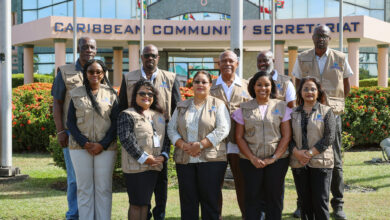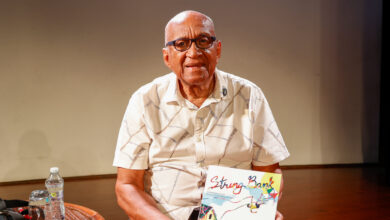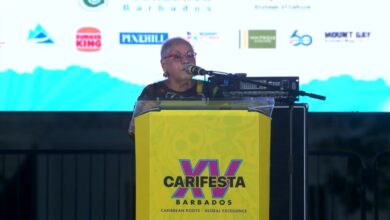(CARICOM Secretariat, Turkeyen, Greater Georgetown, Guyana) Heads of Government of the Caribbean Community (CARICOM) placed emphasis on the deleterious impact of the global economic and financial crisis on the economies of the Member States of the Community during their statements last week at the 67th United Nations General Assembly (UNGA)
The Leaders of Antigua and Barbuda, Guyana, Haiti, Jamaica, St. Kitts-Nevis, Saint Lucia and St. Vincent and the Grenadines addressed the forum at the UN Headquarters, New York, USA and stressed that their critical economic situation was being compounded by the advent of “graduation” or “differentiation” in which most CARICOM Member States, categorised as Middle Income Countries (MICS), were increasingly denied access to concessionary funding and development assistance. The Community has been lobbying actively for quite some time against “graduation” and the related arbitrary categorization by international development partners based on their relatively high per capita income but which ignores debilitating variables such as vulnerability and high debt burdens.
The challenges of climate change, sustainable development and crime and security were also commonly treated themes. In this latter regard the Heads of Government voiced their concern over the inability of the international community to conclude the Arms Trade Treaty (ATT) which by regularising the trade in small arms and light weapons would facilitate the battle against arms trafficking, a major contributing factor to rising armed crime in the region.
CARICOM Foreign Ministers were also active in New York last week, convening the annual Informal Consultations of CARICOM’s Council for Foreign and Community Relations (COFCOR) during which they debated the major themes and issues on the Assembly’s agenda that were of special interest to the Community in order to co-ordinate positions. These issues included the follow-up action regarding the High Level Meeting on Non-Communicable Diseases which took place at the UNGA last year and which was spearheaded by the Community, an update on the longstanding efforts to reform the UN Security Council and on the outcome of the recent Negotiating Conference on the Arms Trade Treaty (ATT).
The Council also looked at the formalization of the Green Fund, a financial mechanism established at the 16th Conference of Parties of the UN Framework Convention on Climate Change (UNFCCC) to help developing countries undertake climate change adaptation and mitigation activities and received an update on the construction of a Permanent Memorial to the Abolition of the Slave Trade on which the CARICOM Permanent Representatives to the UN in New York play a leading role. The Foreign Ministers deliberated over the process of change in the Middle East and North Africa and the resulting new challenges and also reviewed and endorsed CARICOM candidatures as well as requests from Third States for support for their candidatures.
In preparation for the meeting of Foreign Ministers of the Community of Latin American and Caribbean States (CELAC) which took place later that week in the margins of the UNGA, the Foreign Ministers also exchanged views on the activities of this new integration process and their implications for the Community. The Council was addressed by the Foreign Ministers of Australia and Spain whose countries are active international development partners of the Community, and the Foreign Minister of Cuba who touched on the scheduled future meeting of CARICOM-Cuba Foreign Ministers.
At a meeting with their Nordic counterparts (Finland, Norway, Sweden, Denmark, Iceland) matters of mutual concern were discussed including the increasing impact of climate change (rising sea levels and the accelerating melting of the polar caps), the delay in concluding the ATT, alternative energy, high debt levels and sustainable development on which both shared their disappointment over the lack of commitment by the major economies in the outcome of the recent Rio+20 Conference. The Foreign Ministers took the opportunity to request the support of their Nordic colleagues in the Community’s on-going lobby with regard to the Region’s position on provisions in the Union’s draft policy paper on development assistance. The draft development policy is being debated by the EU currently and if accepted in its present form, would cut off Middle Income Countries from EU development assistance. Most CARICOM Member States are categorised as Middle Income Countries (MICS).





